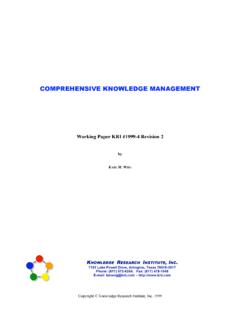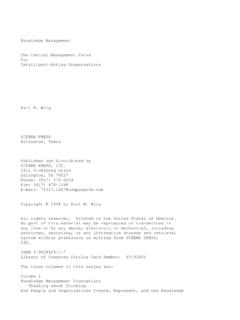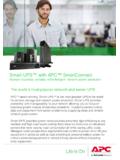Transcription of Knowledge Management Glossary - Home | Knowledge …
1 1 Knowledge Management GlossaryKnowledge Research Institute, Inc. and Other Reasoning: A special case of inductive reasoning resulting in specific assertions that imply theavailable information in context of the background Knowledge without logical certainty. Example: Premise:"Those dogs are mastiffs." Background Knowledge : "All Erik's dogs are Mastiffs." Hypothesis: "Perhaps thosedogs are Erik's."Acquisition: (Also see Knowledge Acquisition) Knowledge may be acquired and represented for inclusion in aknowledge model.
2 Acquisition can be performed by eliciting Knowledge from a domain expert, inducingknowledge from examples, porting Knowledge from databases, and by other Space: The realm, the space, within which a person or enterprise is competent, willing,comfortable or otherwise prepared to make decisions and act. The Action Space is not a passive domain withfixed boundaries. It is formed by the creative capabilities, methodologies and attitudes, mentalities andmotivations that allow actors to perform regular tasks and consider novel actions and innovate within theboundaries of what they find to be permissible and acceptable and is closely related to what is considered tobe : An agent that perform actions predominantly a person but can be an organizational entity or acomputer programmed to handle learning: See: Single-Loop LearningAdjacent Function.
3 A business function that exchanges (provides or receives) consultation or collaborationresources, information, or secondary work products with the target action review: A process developed by the US Army to help teams to learn quickly from their successesand failures and share their learning with other teams. Involves conducting a structured and facilitateddiscussion after a task or project has been completed to review what should have happened, what actuallyhappened and why it happened; this allows participants to learn how to sustain strengths and improve onweaknesses in subsequent tasks or Technologist: A professional with good applied Knowledge of basic AI techniques and selected tools usedin the professional's environment.
4 AI technologists are capable encoders of Knowledge from codifiedknowledge and may be proficient AI Intelligence (AI): AI is sub field of computer science concerned with pursuing the possibility that acomputer can be made to behave in ways that humans recognize as 'intelligent' behavior in each AI becomes a broader field than AI, including cognitive, social and Management intelligence: A broad term describing the field of developing computer programs to simulate humanthought processes and Management Mentality: Management attitude and practice required manage intangible assets with thesame objectives as for tangible assets.
5 The mentality to focus on operational and strategic objectives to create,renew and maintain, safeguard, and utilize and leverage Intangible Capital throughout the Knowledge : Explicit Knowledge that has been embedded in an automatic device (such as acomputer).Automatic Knowledge : The lowest abstraction level of conceptual Knowledge , where we hold RoutineWorking Knowledge . We know this Knowledge so well that we have automated it. Most has become tacit --we use it to perform tasks automatically -- without conscious or Automatized Knowledge : The lowest abstraction level of tacit Knowledge .
6 People know thisknowledge so well that it has been automated and is used to perform tasks automatically -- without : A (computerized) search technique used in production ( , "if-then" rule) with the action clause of a rule and works backward through a chain of rules in an attempt to find averifiable set of condition clauses. (Also termed "goal-oriented reasoning" or "top-down search.") Inferenceengines backward-chain from one if-then rule to other rules in the Knowledge base to find new valuesneeded to test if-conditions stated in the scorecard: A business model developed by Kaplan and Norton as a tool to measure organizationalperformance against both short and long-term goals.
7 The balanced scorecard is designed to focus managers'attention on those factors that most help the business strategy and so alongside financial measures, it addsmeasures for customers, internal processes and employee learning. Some organizations have used thebalanced scorecard model in setting and measuring Knowledge Management Knowledge Analysis (BKA): A relatively extensive analysis and characterization of the Knowledge inthe task environment. It focuses on how Knowledge is held, used, etc., and encompasses Task EnvironmentAnalysis (TEA), Critical Knowledge Function Analysis (CKFA), business function analysis, and knowledgeacquisition -- or Knowledge elicitation and : The practice of comparing the performance of your organization, department or functionagainst the performance of 'the best' - whether they be other organizations, industry standards or internaldepartments.
8 The aim is to look at how well you are doing compared to others in the same field or industry,and to learn from their best practices as a basis for improving your practice (or: Good practice): A process or methodology that has been proven to work well and producegood results, and is therefore recommended as a model. Some people prefer to use the term 'good practice' asin reality it is debatable whether there is a single 'best' Systems: Knowledge -based systems that consist of several separate reasoning processes that use a"blackboard" to "post" intermediate results or information that needs to be communicated between the varioussystems.
9 Blackboard systems may be used for multiple-hypothesis : See: Web BrowserCCapacity building: A term sometimes used in Knowledge Management to describe the process of enhancing anorganization s ability to implement Knowledge Management principles and Learning: Approach to learning using cases (stories, scenarios, descriptions of real events, etc.)to illustrate the material to be internalized. Case-based learning is supportive of building mental Reasoning (CBR): Reasoning approach often used by people but also implemented as KBSreasoning strategy.
10 In case-based reasoning we compare the present situation or condition to previouslyexperienced situations (reference cases) and interpolate between the most likely ones to arrive at conclusionsfor how to handle the present : See Computer-Based Factor: Either a number supplied by an expert system to indicate the system's level of confidence inthe conclusion, or a number supplied by the user of an expert system to indicate the user's level of confidencein the validity of the information supplied to the : A person who proactively promotes something with the aim of persuading others of its Information Officer (CIO): A senior position with strategic responsibility for information managementand information Knowledge Officer (CKO).






